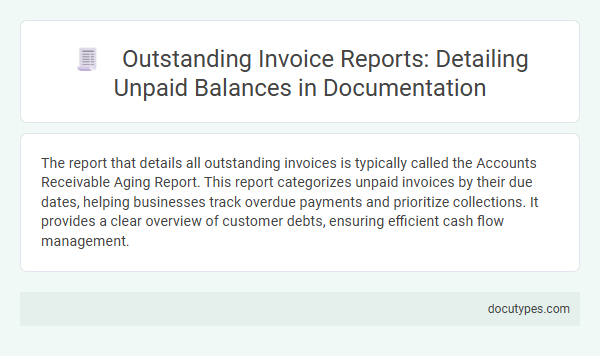The report that details all outstanding invoices is typically called the Accounts Receivable Aging Report. This report categorizes unpaid invoices by their due dates, helping businesses track overdue payments and prioritize collections. It provides a clear overview of customer debts, ensuring efficient cash flow management.
Introduction to Outstanding Invoice Reports
Outstanding invoice reports provide a comprehensive overview of all unpaid bills within a specific period. These reports help businesses track pending payments and manage cash flow effectively.
- Invoice Summary - Lists all invoices that remain unpaid, including their due dates and amounts.
- Customer Details - Shows the clients associated with each outstanding invoice for targeted follow-ups.
- Payment Status - Indicates the age of each invoice to prioritize collection efforts.
Your ability to monitor outstanding invoices through these reports is essential for maintaining financial stability.
Importance of Tracking Unpaid Balances
The Accounts Receivable Aging Report details all outstanding invoices, categorizing them by the length of time they have been unpaid. This report provides businesses with critical insight into overdue payments and helps prioritize collection efforts.
Tracking unpaid balances is essential for maintaining healthy cash flow and minimizing financial risk. Timely identification of overdue invoices allows businesses to address payment delays promptly and improve overall financial management.
Key Components of an Outstanding Invoice Report
What report details all outstanding invoices? An Outstanding Invoice Report provides a comprehensive list of all unpaid invoices within a specific period. This report helps businesses track amounts due and manage accounts receivable efficiently.
What are the key components of an Outstanding Invoice Report? Essential elements include the invoice number, client name, invoice date, due date, outstanding amount, and payment status. Clear presentation of these details enables accurate financial monitoring and timely follow-up with customers.
Categorizing Unpaid Invoices by Age
The Accounts Receivable Aging Report details all outstanding invoices by categorizing unpaid invoices based on their due dates. This report groups invoices into aging categories such as current, 30 days past due, 60 days past due, and beyond, enabling businesses to track overdue payments effectively. Analyzing this report helps prioritize collections and manage credit risk efficiently.
Identifying Long-Overdue Accounts
| Report Name | Outstanding Invoice Detail Report |
|---|---|
| Purpose | Lists all unpaid invoices with detailed aging to identify long-overdue accounts |
| Key Features |
|
| Business Use | Identifies customers with significantly overdue payments enabling collection teams to prioritize account management and reduce bad debt risks |
| Data Sources | Accounts receivable ledger, customer billing database, payment history records |
| Frequency | Typically generated weekly or monthly depending on company's credit control policies |
| Output Format | Tabular report with sorting and filtering capabilities to quickly spot long overdue invoices |
Methods for Generating Invoice Reports
The report that details all outstanding invoices is commonly known as the Accounts Receivable or Invoice Aging Report. This report helps track unpaid invoices by customer and due date, improving cash flow management.
- Accounting Software Reports - Most accounting platforms generate detailed outstanding invoice reports with customizable filters for date range and customer.
- ERP System Integration - Enterprise Resource Planning systems consolidate invoice data, enabling comprehensive reports on overdue payments and aging balances.
- Manual Spreadsheet Compilation - You can create invoice reports by extracting data from invoices and payments into spreadsheets for customized analysis and tracking.
Interpreting Unpaid Balance Data
The Outstanding Invoices Report details all unpaid invoices within a specified period, providing a comprehensive overview of pending payments. This report allows businesses to track customer payment statuses and manage cash flow effectively.
Interpreting unpaid balance data involves analyzing invoice dates, amounts, and aging periods to identify overdue payments and payment trends. Accurate interpretation helps prioritize collection efforts and improve financial forecasting.
Integrating Outstanding Invoice Reports with Accounting Systems
Outstanding invoice reports detail all unpaid invoices, including invoice numbers, due dates, amounts, and client information. Integrating these reports with accounting systems streamlines financial tracking, improves accuracy, and enables real-time updates on payment statuses. This integration enhances cash flow management and supports timely follow-up on overdue payments.
Best Practices for Resolving Outstanding Balances
A report detailing all outstanding invoices provides a comprehensive overview of unpaid customer balances categorized by due dates and amounts. This report is essential for effective accounts receivable management and timely collection efforts.
- Invoice Aging Report - Lists all unpaid invoices organized by the length of time they have been outstanding, helping prioritize collection activities.
- Customer Statement Report - Summarizes each customer's total outstanding balance and transaction history to facilitate accurate communication and dispute resolution.
- Detailed Invoice Report - Shows individual invoice details including due dates, amounts, and payment status to identify overdue payments and track resolution progress.
What Report Details All Outstanding Invoices? Infographic

